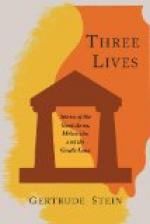It had not been all comfort for our Anna, these months of knowing Mrs. Drehten. It had made trouble for her with the family of her half brother, the fat baker.
Her half brother, the fat baker, was a queer kind of a man. He was a huge, unwieldy creature, all puffed out all over, and no longer able to walk much, with his enormous body and the big, swollen, bursted veins in his great legs. He did not try to walk much now. He sat around his place, leaning on his great thick stick, and watching his workmen at their work.
On holidays, and sometimes of a Sunday, he went out in his bakery wagon. He went then to each customer he had and gave them each a large, sweet, raisined loaf of caky bread. At every house with many groans and gasps he would descend his heavy weight out of the wagon, his good featured, black haired, flat, good natured face shining with oily perspiration, with pride in labor and with generous kindness. Up each stoop he hobbled with the help of his big stick, and into the nearest chair in the kitchen or in the parlour, as the fashion of the house demanded, and there he sat and puffed, and then presented to the mistress or the cook the raisined german loaf his boy supplied him.
Anna had never been a customer of his. She had always lived in another part of the town, but he never left her out in these bakery progresses of his, and always with his own hand he gave her her festive loaf.
Anna liked her half brother well enough. She never knew him really well, for he rarely talked at all and least of all to women, but he seemed to her, honest, and good and kind, and he never tried to interfere in Anna’s ways. And then Anna liked the loaves of raisined bread, for in the summer she and the second girl could live on them, and not be buying bread with the household money all the time.
But things were not so simple with our Anna, with the other members of her half brother’s house.
Her half brother’s family was made up of himself, his wife, and their two daughters.
Anna never liked her brother’s wife.
The youngest of the two daughters was named after her aunt Anna.
Anna never liked her half brother’s wife. This woman had been very good to Anna, never interfering in her ways, always glad to see her and to make her visits pleasant, but she had not found favour in our good Anna’s sight.
Anna had too, no real affection for her nieces. She never scolded them or tried to guide them for their good. Anna never criticised or interfered in the running of her half brother’s house.
Mrs. Federner was a good looking, prosperous woman, a little harsh and cold within her soul perhaps, but trying always to be pleasant, good and kind. Her daughters were well trained, quiet, obedient, well dressed girls, and yet our good Anna loved them not, nor their mother, nor any of their ways.
It was in this house that Anna had first met her friend, the widow, Mrs. Lehntman.




